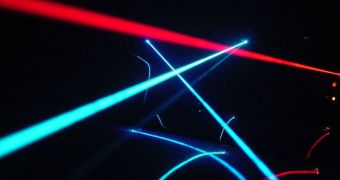In a research published in the June 25th issue of the scientific journal Nature, experts from the University of Michigan report the development of a new laser technology that allows for a greater magnetic field stability in quantum dots (QD), which are one of the candidates for the main components of quantum bits (QB).
When they started the research, the UM investigators had an array of semiconductor quantum dots, which, as it turns out, were very susceptible to the fluctuations of the atoms making them up. In other words, if one of the atoms exhibited a fluctuation in its magnetic field, however small, the entire QB would lose all the information it was told to hold. However, the team of experts discovered that, by using a certain type of laser, they could elicit a response in the QD that essentially stabilized their magnetic fields, allowing them to retain the information for longer.
In charge of the new study was Duncan Steel, who is a professor in the Department of Physics and the Robert J. Hiller professor of electrical engineering and computer science at the university. He said that the properties that QB had, of being in two opposite states at the same time (as in “on” and “off”), were essential for quantum computing, and that these traits would eventually lead to better computer security, encryption and processing speeds. Breaking codes or creating impenetrable ones will become a lot easier with this new technology.
“In our approach, the quantum bit for information storage is an electron spin confined to a single dot in a semiconductor like indium arsenide. Rather than representing a 0 or a 1 as a transistor does in a classical computer, a quantum bit can be a linear combination of 0 and 1. It's sort of like hitting two piano keys at the same time. One of the serious problems in quantum computing is that anything that disturbs the phase of one of these spins relative to the other causes a loss of coherence and destroys the information that was stored. It is as though one of the two notes on the piano is silenced, leaving only the other note,” the expert says.
The laser “discovery was quite unexpected. Naturally occurring, nonlinear feedback in physical systems is rarely observed. We found a remarkable piece of physics in nature. We still have other major technical obstacles, but our work shows that one of the major hurdles to quantum computers that we thought might be a show-stopper isn't one,” he concludes.

 14 DAY TRIAL //
14 DAY TRIAL //